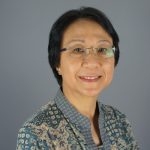‘The Word became flesh and blood, and moved into the neighbourhood… Generous inside and out, true from start to finish’ (John 1:14, The Message).
Our Lord came to us to humbly serve us and generously bless us. So ‘we must take the church—the body of Christ with all its spiritual engagement and blessings—to people with disabilities who cannot come to church,’ writes Dave Deuel, Lausanne Catalyst for Disability Concerns, in ‘Taking Church to People with Disabilities: A new initiative for the Lausanne Disability Concerns Network’. To complement traditional mission, vocational disability professionals can play a unique role at home, at work, and in our neighborhood, bringing the love of Christ and spiritual care to people where they are and equipping them for ministry. ‘People with disabilities whom they serve through care can grow spiritually while they receive encouragement to find their own giftedness and calling.’
In order to bring healing and transformation through incarnational mission, we need ‘to cultivate the art of listening and (re)imagining’ through three key aspects: ‘the verbal, the body, and the silence’, as Xiaoli Yang invites us in ‘The Transformative Power of Deep Listening: (Re)Imagining in Global Mission’. Xiaoli, an Australian Chinese theologian, uses Chinese etymology and other cultural traditions to illustrate what it means to develop ‘a holistic embodiment of listening’. As exemplified by Christ’s incarnation, ‘indigenous and contextual mission must emerge out of a deep sense of listening and imagining in the local soil, both among ourselves and with those we serve cross-culturally.’ In the next two articles, we see how this incarnational principle can be applied to reach the Majority World.
As ‘missionaries from the Majority World increasingly join the global workforce’, Paul Sungro Lee, a Korean scholar-practitioner of world mission, argues in ‘Utilizing Indigenous Cultural Traits for Cross-Cultural Missions: Missiological Applications’ that it is more advantageous for these missionaries ‘to connect intimately with those of similar backgrounds in other Majority World nations where they are sent to minister’. They will be able to use their common ‘indigenous cultural attributes’ in their mission strategies. He illustrates this approach by giving examples of Korean/Asian distinctives, Brazilian/South American distinctives, and Kenyan/African distinctives. Finally, he proposes raising ‘missionary candidates who are not afraid of healthy analysis of their own cultures, who apprehend cross-cultural contextualization of the gospel, and who willingly go to surrounding under-reached target cultures.’
In ‘Rethinking Contextualization in Cameroon: The context-emergence approach for cultural understanding of the gospel’, Emmanuel Oumarou, a missiologist from Cameroon, investigates the state of contextualization in Cameroon. He adopts an approach which he describes as the context-emergence approach. ‘This approach highlights the incarnational emergence of the expressions, forms, and practices of Christianity from inside a context’, in contrast to the context-insertion approach, which ‘allows the adaptation of foreign Christian thoughts and practices from the culture of a missionary in a host culture’. As he evaluates contextualization in Cameroon, he finds that evangelicals’ attempt to translate the Christian faith into local Cameroonian cultures predominantly falls under context-insertion rather than context-emergence. ‘This orientation is noticeable in various dimensions of evangelical expressions of the Christian faith such as the kerygmatic, liturgical, and theological dimensions.’ ‘To remedy this situation and enable a proper translation of the Christian faith in Cameroon cultures,’ the author recommends several action points for Cameroonian evangelicals.
In Philippians 2:5, we are exalted to have ‘the same mindset as Christ Jesus’—the same attitude and approach. May the articles in this issue challenge us to be like Christ—to go to where the people are, live among them, listen to them, connect intimately with them, and humbly serve them.
Lausanne Global Analysis is also available in Portuguese, Spanish, French, and Korean. Please send any questions and comments about this issue to [email protected]. The next issue will be released in May 2023.

